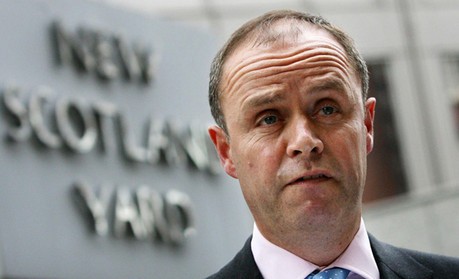
John Yates outside Scotland Yard
Credit: Lewis Whyld/PAFive senior past and present Metropolitan police officers are to appear before a parliamentary select committee beginning today to be questioned about the force's investigation into phone hacking.
Current assistant commissioner John Yates, who will appear first before the home affairs select committee today, reviewed the initial investigation into phone hacking in 2009, and ruled there was not sufficient new evidence to reopen a police inquiry.
In a letter to the committee chairman Keith Vaz on Monday, Yates denied he had been asked to undertake a review of the initial inquiry, which took place in 2006/7 and led to the imprisonment of private investigator Glenn Mulcaire and News of the World royal correspondent Clive Goodman, claiming instead that he discussed it with the officer at the helm and was told there was no justification for a fresh investigation:
"Following detailed briefings from the senior investigating officer, it was apparent that there was no new material in the Guardian article that would justify either reopening or reviewing the investigation. A short while later, this view was endorsed independently by the director of public prosecutions, Keir Starmer QC.
"Therefore, as can be seen, in relation to events that took place in 2009, I was provided with some considerable reassurance (and at a number of levels) that led me to a view that this case neither needed to be reopened or reviewed."
Yates appeared before the select committee again in 2010, when he acknowledged there were far more than "eight to 12" victims when committee member and labour MP Chris Bryant accused him of misleading the committee previously in informing them there were only eight to 12 victims of phone hacking.
By that point a new police inquiry had been launched after additional information was provided to the Met police by the News of the World that indicated there were many more victims, but Yates said Bryant was "materially wrong" to accuse him of misleading the committee.
Yesterday Bryant called for Yates to resign, claiming that he was guilty of "repeatedly lying" to MPs.
Fellow Labour MP Tom Watson, who successfully lobbied for an emergency House of Commons debate on the phone-hacking scandal after revelations about Milly Dowler's phone being hacked, joined Bryant in calling for Yates' resignation, saying that he had "misled parliament" and his position was "untenable".
Watson also heavily criticised Yates in parliament, saying his "review of the Mulcaire evidence was not an oversight. Like Andy Hayman, he chose not to act, he misled parliament. He misled readers of the Sunday Telegraph only yesterday".
Watson was referring to a Telegraph interview Yates gave last week in which he expressed "massive regret" over the hacking of Milly Dowler's phone and acknowledged the scandal had been a "very damaging episode" for the force.
Yates told the newspaper: "I am accountable and it happened on my watch and it's clear I could have done more.
"I have regrettably said the initial inquiry was a success. Clearly now that looks very different."
Also appearing before the select committee today are former assistant commissioner Andy Hayman, who led the 2006/7 inquiry, former counter-terrorism chief Peter Clarke and Sue Akers, who is at the the helm of the current phone-hacking inquiry. Hayman left the force in 2007, after questions were raised in the media about the nature of his relationship with a married woman working for the Independent Police Complaints Commission.
According to a report by the New York Times, five senior Met officers investigating phone hacking were themselves targeted by the News of the World. The report goes on say that, among the 11,000 pages of documents seized from Mulcaire when he was arrested the Met also found the names of former commissioner Sir Ian Blair and "at least two other senior police officials involved in the inquiry".
The Met announced last week that it was referring it's internal investigation into payments made to officers by staff at the News of the World to the IPCC.
The force originally decided to conduct its own investigation, but shifted it to the independent commission after "significant public and political concern".
Free daily newsletter
If you like our news and feature articles, you can sign up to receive our free daily (Mon-Fri) email newsletter (mobile friendly).











